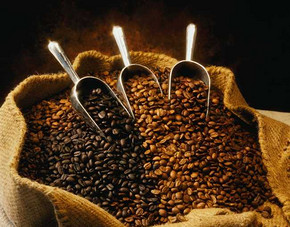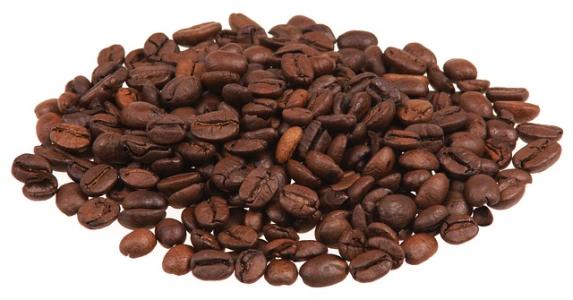What's the difference between Arabica and Robusta coffee?
Follow the caf é (Wechat official account vdailycom) and found that Beautiful Cafe opened a small shop of its own.
"Coffea Arabica" and "Coffea Robusta" are two different coffee varieties, which currently account for the vast majority of coffee bean production in the world. There are three main differences between Arabica coffee and Robusta coffee: 1. Differences in planting conditions. two。 The flavor and characteristics are different. 3. The difference between market price and use.

Planting condition difference
The planting conditions of "Arabica" coffee are relatively stringent, requiring higher elevations (6 to 2000 meters above sea level), fertile soil fertility, adequate moisture, proper sunshine conditions and shade. "Arabica" coffee species are less resistant to diseases and insect pests and are vulnerable to damage. In addition, the annual output of coffee trees per unit area is also lower.
Currently, "Arabica" coffee accounts for 75% of the world's coffee production, and of these "Arabica" coffee production, only 10% of Arabica coffee quality can be classified as "boutique coffee (Specialty Coffee)."
"Robusta" coffee, commonly known as "sturdy beans", can be grown at low elevations (200 to 800 meters above sea level), has strong resistance to diseases and insect pests, is not vulnerable to agricultural disasters, has a high annual output per unit area, and is harvested in large quantities by machine. in general, the cost of production is much lower than that of Arabica coffee.
Different flavors and characteristics
Arabica coffee has a varied and broad potential flavor. Arabica coffee produced in different regions, different elevations and different climates usually has its own characteristics and can show a completely different flavor. "Arabica" coffee smells like grass when it is not roasted. After proper roasting, it shows "fruity" (medium-light roasting) and "caramel sweetness" (deep roasting). Generally speaking, it has a better aroma and flavor than Robusta beans.
"Robusta" coffee usually has an ordinary, rigid and pungent flavor, and because the vast majority of robusta around the world are grown in low-altitude areas (author's note: as of May 2008, only India has rare high-altitude, high-quality, washed Robusta coffee beans). The flavor produced by different regions and different climates is not very different, relatively lack of personality. When unbaked, it smells like raw peanuts, and the taste of cheap robusta coffee beans is usually between "wheat tea" (light baking) and "rubber tire flavor" (deep roasting). It is difficult to show fine flavor.
Difference between market price and use
High-quality Arabica coffee requires a cumbersome process of hand picking, selection and fine processing, so the world's most expensive and best coffee beans are Arabica coffee. "Robusta" coffee is usually used to produce instant coffee and canned coffee because of its low cost. A small number of better quality "Robusta" coffee are also used in mixed coffee (with Arabica coffee) espresso beans.
Other differences
There is another important difference: the amount of "Caffeine" (C8H10N4O2). Robusta coffee contains about twice as much caffeine as Arabica coffee, which is why drinking some canned coffee is prone to palpitations and insomnia.
After seeing so many differences between Arabica Coffee and Robusta Coffee, we must finally emphasize:
"Arabica coffee" is not the same as "good coffee", "Robusta" is not absolutely cheap coffee!
Arabica coffee accounts for 75% of the world's coffee production, and its quality varies widely, from good to bad. In recent years, a few countries (such as India) have devoted themselves to improving the quality of robusta coffee. They have planted robusta in high altitude areas, given the most careful care, and carefully washed the coffee. As a result, they get very good quality robusta coffee beans! Top Robusta beans are not cheap either, getting rid of the old impression that Robusta are cheap beans! Therefore, the quality of coffee beans can no longer be judged by the crude and outdated ancient criterion of "Arabica beans".
Important Notice :
前街咖啡 FrontStreet Coffee has moved to new addredd:
FrontStreet Coffee Address: 315,Donghua East Road,GuangZhou
Tel:020 38364473
- Prev

The story of Indian coffee, the method of making Indian coffee
Follow Cafe (Wechat official account vdailycom) found that Beautiful Cafe opened a small shop of its own. A long time ago, a boy heard a story about a boy who asked a waiter to add salt to his coffee in order to attract the attention of a girl. Finally, the boy attracted the girl's attention, and finally married the girl, so he drank salted coffee for decades.
- Next

The difference between Arabica and Robusta Coffee varieties which is better than the harm of Robusta beans
Follow the caf é (Wechat official account vdailycom) found that the beautiful cafe opened a small shop of its own Arabica: accounting for 65% of the global coffee production, basically what you drink better outside belongs to Arabica Robusta: the taste is heavy, more exciting, mostly used for instant coffee. Three big
Related
- Detailed explanation of Jadeite planting Land in Panamanian Jadeite Manor introduction to the grading system of Jadeite competitive bidding, Red bid, Green bid and Rose Summer
- Story of Coffee planting in Brenka region of Costa Rica Stonehenge Manor anaerobic heavy honey treatment of flavor mouth
- What's on the barrel of Blue Mountain Coffee beans?
- Can American coffee also pull flowers? How to use hot American style to pull out a good-looking pattern?
- Can you make a cold extract with coffee beans? What is the right proportion for cold-extracted coffee formula?
- Indonesian PWN Gold Mandrine Coffee Origin Features Flavor How to Chong? Mandolin coffee is American.
- A brief introduction to the flavor characteristics of Brazilian yellow bourbon coffee beans
- What is the effect of different water quality on the flavor of cold-extracted coffee? What kind of water is best for brewing coffee?
- Why do you think of Rose Summer whenever you mention Panamanian coffee?
- Introduction to the characteristics of authentic blue mountain coffee bean producing areas? What is the CIB Coffee Authority in Jamaica?

